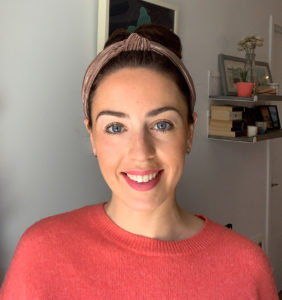
The magical and mystical ‘pregnancy glow’ can be elusive for many women. If you’re lucky enough to be one of the mamas-to-be who benefits from the changes in your hormones during pregnancy, then you should see some welcome improvements to your hair, skin and nails during pregnancy (especially from the second trimester onwards). If you’re currently enjoying clearer skin and glossier locks, there are still a few things you should consider during pregnancy to set you up for the healthiest hair and skin possible post-pregnancy.
Set yourself up for holistic health
Start by making sure you have high quality and ‘clean’ products in your cupboard and focus on establishing a routine that will bring you long term results. You’re probably already more aware of what you’re putting on your body, but a holistic approach to your health will set you up with a new perspective on beauty and wellness. It doesn’t need to be expensive, you might find lots of the products you’re already using are all pregnancy-safe and fine to keep using, or you might just switch one or two items.
What is clean beauty?
A clean beauty regimen includes everything topical that you’re putting on to your body, such as shampoo, cleanser, fragrance, makeup and deodorant as well as any supplements you might be taking. ‘Clean’ doesn’t mean free from chemicals, plant-based or void of long-words on the back of your personal care products. Clean products can have natural or synthetic ingredients (or both), but they should be free from known toxic ingredients and endocrine disruptors (or hormone disruptors), which means looking at what ingredients are in your current products and making swaps where necessary. Many retailers have started to make their own definitions of ‘clean’ as the industry is highly unregulated, so shopping at Follain, Credo, The Detox Market, or Clean at Sephora are quick ways to help navigate and find safe options.
How do I know if the products I’m using are safe during pregnancy?
On average we use 16 personal care products a day so it might be easier to donate some of your favorites to your loved ones or put them away until post-pregnancy. But if you want to go through everything you currently use and check the ingredients, you can use a database such as EWG’s to look up every ingredient.
Some quick tips for scanning labels include always looking for paraben-free and always avoiding the following ingredients due to their hormone disrupting properties; BHA (Butylated Hydroxyanisole), Triclosan and Triclocarban, Phthalates (common in synthetic fragrances and nail polishes), Aluminum Compounds and Formaldehyde.
It’s also a good time to spring clean your makeup bag and throw away any old products. Mascaras have a very short shelf life of 3 months, foundations around 6-12 months, and anything powder is around 1-2 years. Hair products tend to have 1 year shelf life. If anything has separated, changed color or smells different it’s definitely best to just ditch it.
Preparing for skin and hair changes
It might feel like you’ve already adapted so much in your life as part of your preparations since learning you’re pregnant. It’s worth tracking your skin and hair during pregnancy and beyond as it is common for women to experience pregnancy acne during or post-pregnancy as well as changes to the texture and thickness of their hair. But rest assured, there are a lot of things you can do to strengthen your hair, care for your skin and quickly take control.
What is pregnancy or postpartum acne?
During pregnancy, usually during the first trimester, as well as postpartum, the huge hormone fluctuations are the driver of hormonal acne. Drops in estrogen enable testosterone to take a bigger role and excess oil and sebum production leads to an increase in spots. Research around acne medication during pregnancy is limited, but it is best to avoid medications such as Accutane which has been linked to birth defects.
How can I treat my skin if I get acne during pregnancy?
Always go to bed with clean skin and any makeup removed. Look for skin cleansers with exfoliating alpha-hydroxy acids (AHA) which will help unblock pores and keep your skin clear. Also, avoid heavy topical products which might clog up your skin.
For the active mamas, look for a post-workout hydrating toner which can gently remove your face of any extra makeup, oil or residue and refresh your skin without any dryness.
If you’re getting dark spots, try using a sunscreen to prevent them from getting worse as during pregnancy the hormone changes mean your skin can be prone to dark marks, often called the ‘pregnancy mask’ or melasma. The dark spots are caused by an increase in the body’s melanin and usually fade after you’ve given birth but for some women the patches can last for years, so it makes sense to wear sunscreen and protect them from darkening.
Finally, and often the hardest one of all, avoid picking or squeezing to prevent scarring and inflammation. Of course, much easier said than done, but the extra melanin could make the scars last a lot longer than normal (if you need an extra incentive to let the bumps be).
Changes in your hair take longer to show
When most of us think about our skin during pregnancy, we tend to just think about stretch marks and preparing to have a bump (and bank on those rosy cheeks). Hair health remains a relatively unknown and confusing part of the changes women experience during and post-pregnancy. The physical changes are harder to understand than our skin because the hair we can see is dead and it takes months to see the impact of changes we make to our routine or our hormones. We’re also more aware of stretch marks and you can’t miss acne, so caring for our hair is often left by the wayside.
It’s worth thinking about your hair care regime early, even while you’re trying to conceive! Hair cycles are six months so the changes you make will take six months to show an impact.
What is postpartum hair loss?
Many women start to enjoy thicker hair during the second trimester when the growing phase of your hair cycle is extended and you don’t shred as much hair as you would normally. This usually switches around 3-6 months after you’ve given birth and it’s linked to natural hormone changes and breastfeeding. At this point, over 50% of women experience postpartum hair loss, which can feel quite dramatic as all the hair you’ve been growing throughout your pregnancy often falls out very quickly and can leave patches around your hairline. The hormone fluctuations are a normal part of pregnancy, but you can prepare your hair to be as strong and healthy as possible during pregnancy. Hair takes 4-6 months to grow and for you to see the impact of your regimen changes, which means by post-pregnancy, you will have set up your hair to be the best it can be.
How can I get healthy hair during and post-pregnancy?
The same principles apply to hair care as skin care. The scalp is where the root of your hair grows from and it is best to treat it just as you would your face. If you’re able to switch to clean and sustainable ingredients, your hair will thank you and you will be setting yourself up for strong and shiny strands.
Exfoliate your scalp
If you exfoliate and deeply cleanse your scalp, you will keep it free from products, excess oils and pollution build up which will ensure that your future hair will grow thicker and fuller. If you’re working out frequently and soaking your hair with sweat, even more reason to ensure you’re using a scalp scrub at least once a week. A gentle exfoliation with the product and your hands will also encourage microcirculation which will help encourage hair growth.
Don’t be afraid of brushing
Gently brush your hair every day to encourage microcirculation, stimulate the scalp, and to distribute your natural oils through to your mid-lengths and ends. If your hair is drier than normal during pregnancy, be careful with how you brush your hair as it might be brittle or prone to snapping. As a general rule of thumb, your hair is weakest when it is wet, so try to brush your hair only when it is dry. Intensive treatments can be a quick instant way to add a hit of hydration for anyone finding their hair drier than normal.
Diet and nutrition are key for healthy hair growth
Supplements are a great way to encourage healthier hair growth. During pregnancy, a prenatal likely has most of the key vitamins included, and if you’re post-pregnancy, look for a hair, skin and nails supplement with active ingredients to support hair growth. Your diet plays a huge role on the health and vitality of your hair. If you’re eating the foods your hair loves during pregnancy, you’re setting yourself up for beautiful hair during motherhood. Eating lots of fresh protein, oily fish or nuts, fruit and vegetables (especially those with iron) as well as yogurts and milk will ensure you’re getting all the nutrients your hair needs for strong, shiny strands.
Step away from the heat
Try to avoid or minimize using heat styling tools as much as you can and if you use them, always have a heat protector on your strands. This is a great way to keep your hair damage free. This will help get your hair in the best condition for once your baby is born when you might experience postpartum hair loss. It will also ensure your hair is prepped for the easy and quick hairstyles you’ll need to adopt once you’re sleep deprived and only have one arm free!
Contributed by Hannah Dixon, Founder & CEO of Pip, a modern and sustainable health brand on a mission to support women with better education about their hormones. Also check out their Instagram @meetpip where you’ll find inspiration and advice on how to best support your hair and skin throughout your Motherhood journey.
